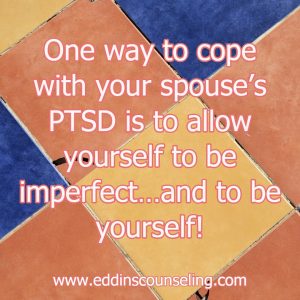June 8, 2016
Living with Your Spouse’s PTSD: 4 Ways to Cope
Written by Rachel Eddins
Posted in Trauma, Grief & Loss and with tags: PTSD/Trauma

With political campaigning in full swing, we’re hearing phrases like “taking care of our vets and their families, who have sacrificed so much.” But for those who are family members of someone who is, or has been, in the service, these are more than just political buzzwords. It is a fact of everyday life. And for many military families, it’s not an easy fact either.
PTSD doesn’t affect only people who have served in the Armed Forces, though it is sadly common among those who have seen active duty. PTSD can really affect anyone who has experienced trauma. We can experience trauma in a variety of ways: developmental trauma such as illness as a young child, interpersonal trauma such as emotional neglect, emotional, physical or sexual abuse, natural disaster, automobile accident, and more (read more about trauma.)
You are right not to discount your spouse’s PTSD, even if he or she had a traumatic experience that seems “less traumatizing” than those experienced by the men and women in the military. One person’s trouble does not invalidate another’s. What is most important to remember about trauma is that it is the impact of the event on the body. Our response to trauma is not “in our heads”, but rather in our bodies. What this means is that we experience the symptoms of trauma similarly despite the type of trauma. Similarly, your spouse’s PTSD does not invalidate your struggle to cope with it and bring a sense of normalcy back into your relationship.
PTSD makes it hard for you and your spouse to continue with the daily lives you lived before. That’s because PTSD causes actual physical changes in the body and the brain. Sometimes the symptoms come and go. You may find that you and your loved one experience “good days” and “difficult days.”
According to the National Center for PTSD, approximately 5.2 million Americans suffer from the disorder in any given year. While that statistic is troubling and sad, it also means you’re not alone in your struggles. Fortunately, there are many resources available to ensure you have more “good days” and to help make the “difficult days” easier to deal with. If your partner thinks they may have PTSD, but isn’t sure, they can complete our online PTSD test.
|
|
Consider the following four ways to cope with your spouse’s PTSD:
1. Get professional help
This may seem obvious, but it is so important that it really is worth mentioning: when it comes to our loved ones, we can sometimes fool ourselves into thinking we know what’s best, or that, if we work hard enough, we can make our loved ones happy. Sometimes we even feel like we’re letting our loved ones down if we reach out for help.
The reality is, we really can’t do it all by ourselves. This goes double for mental health issues. Your spouse’s PTSD has nothing to do with your ability to make him or her happy, so why take the blame for problems you didn’t cause and aren’t trained to solve? It can be scary or embarrassing to ask for help, but know that you’re being brave and doing the right thing for both of you.
Read more: When Your Spouse Refuses to Seek Help
2. Allow yourself to be imperfect…and to be yourself!
This goes along with tip number one, but it’s another crucial step to coping with your spouse’s PTSD. You can’t expect to balance everything life throws at you, so allow yourself to have a slightly more cluttered house than you might nortrmally desire, or drop some

You can’t expect to balance everything life throws at you, so allow yourself to have a slightly more cluttered house than you might normally desire…
other commitments like book club, or maybe even take a break from your child’s PTA meetings, if you have a friend who can fill you in. You need time to cope with your spouse’s PTSD and to make sure that you can take time to care for your own mental health needs as well.
3. Join a support group
Spouses of individuals with PTSD report high rates of social isolation. Even if you’re not feeling up to socializing, meeting up with people going through similar experiences can make you feel less lonely and will undoubtedly give you some good ideas. Contact us for group and support resources.
4. Be physically fit — together
Couples routines like tai chi, yoga, or gentle hiking can help soothe your minds and allow you to spend quality moments together, even if it’s in companionable silence.
EMDR Therapy is an Effective Treatment for PTSD
If your spouse is interested in receiving help, Eddins Counseling Group in Houston offers EMDR therapy, which is a powerful treatment tool for overcoming PTSD. Contact us to find out if EMDR is the right fit for you. To get started now give us a call to schedule an appointment at 832-559-2622 or schedule an appointment online.
Grounding & Self Soothing
Get instant access to your free ebook.
















